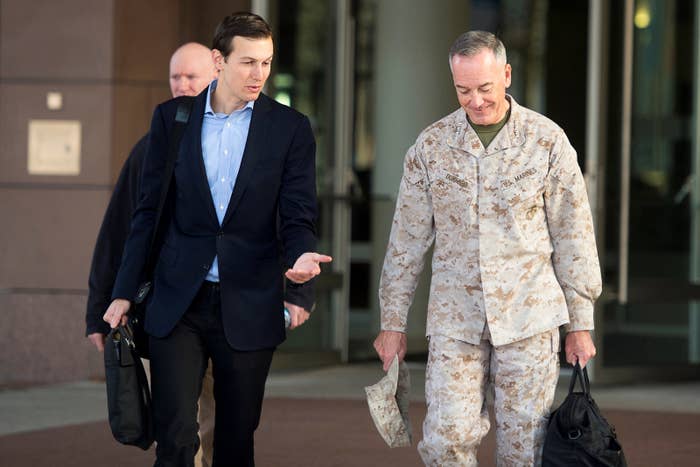
WASHINGTON — Within the halls of the Pentagon, the decision to invite Jared Kushner, the senior adviser to the president who just happens to be his son-in-law, on a military trip to Iraq was heralded as an unconventional — yet brilliant — political move.
After all, Kushner, perhaps more than any other White House adviser is responsible for a seemingly limitless portfolio of matters, both foreign and domestic – Middle East peace, the upcoming visit of Chinese President Xi Jinping to Mar-a-Lago, reforming the entirety of the federal government, and combating opioid addiction to name a few. And while past administrations depended on the National Security Council or a coterie of long-time political operatives, the early days of the Trump administration suggests that to reach Trump, one must travel through the36-year-old man married to the president’s daughter, herself now a senior aide.
Given the Trump White House’s thwarting the conventional chains of command, the Pentagon has decided to go along, in the hopes that the face time — coupled with the experience of traveling to the front lines of the war against ISIS — will become leverage in the discussions about the way ahead.
“You have to understand where the levers are. You don’t have to like it, but that is where they are,” a defense official told BuzzFeed News. “It’s in our interest.”
Kushner, who has no political, military or diplomatic experience, got a crash course on the war from the highest-ranking military leader, Marine Gen. Joseph Dunford, the chairman of the Joint Chiefs of Staff. The trip came with all the trappings of military showmanship — military aircraft shuttled Kushner above the Iraqi capital; he spoke with men and women in uniform serving in often rustic conditions. The White House confirmed on Monday that he'd even met with Iraqi Prime Minister Haider al-Abadi.
The Joint Staff was quick to tweet out pictures Monday of the two together on the ground:
Gen. Dunford is in Iraq w/Mr. @jaredkushner & Mr. @TomBossert to meet w/Iraqi, American & Coalition officials https://t.co/guyGgdCIM8
The pair were scheduled to depart after only four hours on the ground, ensuring Kushner is back in time to manage Xi Jinping’s visit later this week. A visit that brief is not enough to understand the complex situation in Iraq, but for a fleeting moment for first-time visitors, it can feel like it. Dunford said in a statement released Sunday night that he invited Kushner to see events on the ground, "first-hand and unfiltered."
Dunford stood to gain something as well. For him, it was hours of direct access to arguably the most influential White House adviser — 16 hours sealed inside a plane to be exact.
“That is a looong time to have someone’s ear,” a second defense official explained to BuzzFeed News.
Defense officials said while according to the official story, Dunford invited Kushner, they are not sure if the idea was that simple. Rather it was “DoD initiated,” the first defense official said. Secretary of Defense Jim Mattis already had extended a similar invitation to Kushner and Steve Bannon, White House chief strategist.
Top White House advisers in previous administrations have visited Iraq before but were often accompanied by the president when they did. (Neither Trump nor Secretary of State Rex Tillierson have so far visited Baghdad.) Kushner was traveling on behalf of the president, the department said. In addition to Kushner, Dunford also traveled with Thomas Bossert, Trump’s Homeland Security Adviser.
And while Kushner’s role is currently both vast and poorly defined, the White House bypassing the State Department is not unprecedented. Under the Obama administration, for example, bilateral relations with Cuba began with Ben Rhodes, then deputy national security advisor for strategic communications.
Their trip was not without a hiccup. The White House announced Kushner’s imminent arrival through unnamed sources speaking on background, even though military leaders are adamant to not make such pronouncements until the travelers are safe on the ground. Moreover, a Joint Staff statement about the visit made no mention of the embassy staff or the US ambassador to Iraq, Stuart Jones, who also was scheduled to meet with Kushner.
Even the Pentagon is not clear on how precisely Kushner shapes events or decision making at the White House. But given that the White House is currently is debating a Defense Department review of the way in the war against ISIS is waged, the move seems prudent. The war effort has suffered several setbacks in recent weeks as the US military has been accused of killing civilians in three separate strikes, including potentially more than 200 in the ISIS-controlled Iraqi city of Mosul, the site of a major offensive.
So far, the White House has taken a largely hands off approach toward the war on ISIS, deferring to the generals on the ground and combatant commands.
“The thinking was: What have we got to lose?” the first defense official said.
Outside Your Bubble is a BuzzFeed News effort to bring you a diversity of thought and opinion from around the internet. If you don’t see your viewpoint represented, contact the curator at bubble@buzzfeed.com. Click here for more on Outside Your Bubble.
